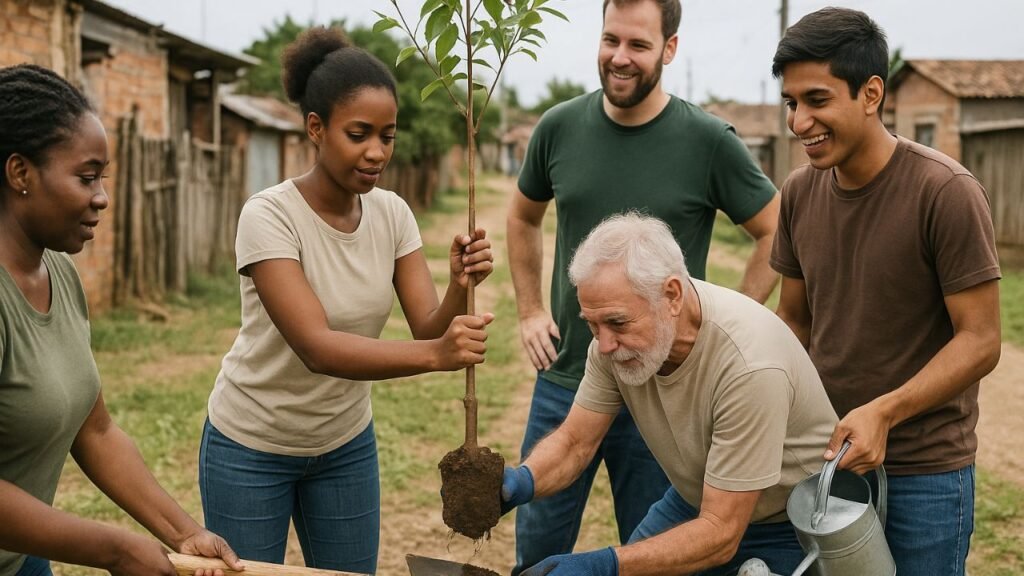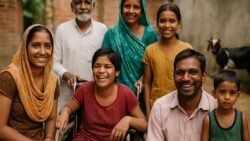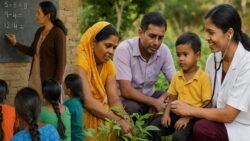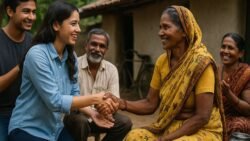Sustainable Change – At UFDP, we believe sustainable change is possible when communities are active partners, not just recipients. Whether in remote hamlets or crowded urban peripheries, marginalized populations often lack access to basic services—education, healthcare, livelihood opportunities, clean water, and safe infrastructure. Our mission is to close these gaps by working hand‑in‑hand with community leaders, local institutions, and households to co‑design interventions that are culturally relevant, cost‑effective, and resilient to changing conditions. By combining community engagement, capacity building, and evidence‑based programming, UFDP strives to foster long‑term improvements rather than quick fixes. We prioritize inclusive approaches so that women, persons with disabilities, and socially excluded groups can participate fully. Our projects not only deliver essential services but also strengthen local systems—teachers, health workers, governance structures—so that communities can sustain gains. When people are empowered, they lead initiatives that align with their needs. We invite you to join us in this journey: contributing time, expertise, resources, or advocacy so together we build healthier, educated, dignified lives across rural and urban marginalized areas.

Empowering Local Education and Lifelong Learning
Education lies at the heart of sustainable change. In many rural areas, children are unable to attend school regularly due to distance, economic hardship, or lack of infrastructure. In urban marginalized communities, overcrowded schools, teacher shortages, and lack of learning materials hamper quality. UFDP supports building or refurbishing community learning centres, training teachers in child‑centred pedagogy, and offering flexible schedules so working children can participate. We also introduce digital literacy, remedial education, and life skills for both youth and adults, enabling them to adapt to evolving job markets. Special emphasis is placed on ensuring girls, children with special needs, and out‑of‑school youth gain access. By weaving education with community values, we promote retention, support parental involvement, and foster learning environments safe for all. Research shows that empowering rural communities through skills training and improved schooling significantly reduces youth unemployment and promotes gender equity. Empowering Rural Communities: Strategies for Sustainable Growth
Building Inclusive Health, Well‑Being, and Infrastructure Access
Sustainable change also requires access to essential health services, clean water, sanitation, and infrastructure. UFDP works with partner health systems, local volunteers, and governments to deliver maternal and child health programs, immunization drives, nutrition awareness, and hygiene education. In rural zones we support mobile outreach clinics; in urban slums we facilitate community health workers who can reach households. Access to clean drinking water, safe latrines, wastewater management, and reliable energy are all part of the infrastructure support we provide so that disease and environmental hazards are minimized. We prioritize solutions that communities can maintain themselves—training local technicians, forming repair committees, and sourcing materials locally. The evidence from rural health toolkits shows that planning for funding sustainability, strengthening partnerships, and building local capacity are critical for keeping health programs effective over long periods. Rural Health Toolkit: Sustainability Strategies
Economic Empowerment and Livelihood Diversification
Income‑generation and livelihood security are essential to sustainable change. UFDP supports micro‑enterprises, cooperative groups, self‑help groups, and skills training tailored to local market demands—agriculture, artisanship, small trade, digital services. In rural areas, we help farmers adopt sustainable agriculture, water harvesting, and climate‑resilient cropping; in urban settings, we assist informal sector workers, street vendors, and youth in acquiring vocational or digital skills. We also facilitate access to fair credit, savings groups, and linkages to markets so that products and services from marginalized communities can reach buyers. Economic empowerment reduces dependency and allows families to invest in health, education, and better housing. Studies demonstrate that when rural communities diversify non‑farm income and access financial services, poverty declines and resilience improves. Sustainable Development in Rural Territories
Partnership, Monitoring, and Sustained Impact
To ensure lasting impact, UFDP builds strong partnerships with government bodies, local NGOs, community institutions, and donors. Each project we implement includes mechanisms for ongoing monitoring, feedback loops with beneficiaries, and adaptation based on what works. We also invest in training community leaders so that after initial support phases, local actors can carry forward initiatives. Transparency in how resources are used, and public reporting of outcomes—such as changes in school enrolment, health statistics, livelihood incomes—helps maintain trust and accountability. Furthermore, we draw upon best practices and research to inform our strategy: for example, successful rural health programs rely on multi‑source funding, capacity building, and robust evaluation frameworks. Supporting Sustainable Rural Communities





